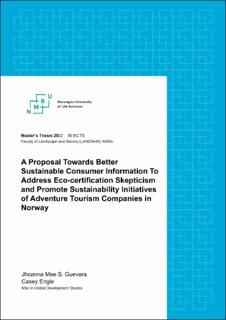| dc.description.abstract | According to the United Nations World Tourism Organization’s Global Report on Adventure Tourism from 2014, there is a growing demand for adventure tourism globally. With Norway abiding by its tourism industry’s slogan— “Powered by Nature—it showcases that Norway’s primary tourism identity rests within nature in the form of adventure tourism. Issues of sustainability in the tourism industry remain paramount as Norway seeks to develop sustainably with tourism. With that, the role of adventure tourism companies in participating in sustainable tourism remains vital.
The thesis extends the researchers’ previous internship work of observing how Scandinavia (i.e., Sweden, Norway, Finland, and Iceland) is home to numerous nature-based tour companies that implement sustainable tourism practices without being eco-certified. Booknordics AS provided access to adventure tourism companies. In effect, to further research on the role of adventure tour companies in sustainable tourism, the study conducted a grounded theory approach to investigate Norwegian adventure tourism companies’ sustainable consumer information on websites and their opinions towards the effectiveness of eco-certification in influencing their sustainability practices. Therefore, the researchers used a combination of purposive, convenience, and snowball sampling to find and select adventure tourism companies to be part of the case. With that, 16 interviews and the websites from Norwegian adventure tourism companies contributed to data collection that was analyzed thematically.
As a result, the thesis presents two main findings. First, both eco-certified and non-eco-certified adventure tour companies’ skepticism to eco-certifications ability to foster sustainable practices roots in three reasons: a) the insufficiency of eco-certifications in representing their sustainable initiatives; b) the lack of a compatible certification scheme focusing on adventure tourism companies; c) the issue of credibility on data reported by eco-certified companies. Second, regardless of being eco-certified or not, Norwegian tour companies voluntarily implement several types of sustainability initiatives which are being regenerative in design, creating value for local communities, and implementing work practices. However, despite the practice of sustainability initiatives amongst adventure tour companies, they lack using a digestible framework to provide better sustainability consumer information on their websites. Therefore, the thesis proposes the Sustainable Consumer Information Badge System as a potential solution to represent a bottom-up policy building with local operators. | en_US |

